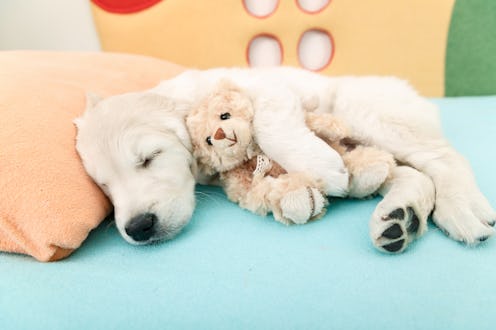Humans aren't the only ones who can suffer from sleep problems. In fact, the signs your dog has a sleep disorder are similar to the signs in humans. According to PetMD, dogs sleep between 12 to 14 hours a day, and if they don't get the right amount of shut eye, they definitely don't feel their best. In fact, the way dogs behave when they don't get enough sleep is pretty similar to how you or I might act after pulling an all-nighter. "Dogs with sleep disorders might whine, cry, or frequently wake up during the night, become more sluggish during the day, or seem more disoriented when performing normal tasks," Dr. JoAnna Pendergrass wrote for PetMD.
"Because sleep deprivation can cause a buildup of stress hormones, dogs with sleep disorders may also become more aggressive or develop other behavioral problems. In addition, a lack of sleep can weaken a dog’s immune system, increasing the risk of infection." If your dog just doesn't seem like itself lately, there are signs that Fido might not be getting enough shut eye and could even have a sleep disorder. The sooner you identify a sleep problem in your dog, the sooner Fido can start feeling better.
1Physical Activity During Sleep
If your dog always seems to be chasing squirrels in its sleep, this could actually be a sign that Fido has a sleep disorder called REM Behavior Disorder. This sleep disorder causes physical activity during sleep. "For some dogs, this activity can become extreme or violent, such as running into walls or attacking inanimate objects," Dr. Pendergrass explained. If your dog experiences this more often than not, head to the vet where you can get a medication that will help Fido rest easier.
2Loud Snoring
Does your dog snore loud enough to wake the dead? While Fido's snoring might be cute, it can also be a sign of sleep apnea, Dr. Dan Matthews explained on his website. "While, not all the cases of snoring point to sleep apnea, it is still worth an investigation, especially if the snoring is loud and frequent." If you dog gasps for breath in between snores, get Fido to the vest ASAP as this condition can be dangerous, and is most common in flat-faced dogs.
3Sudden Collapsing After Activity
Does your dog seem to fall over and pass out after a spurt of physical activity? If the answer is yes, this could be a sign of narcolepsy. Dr. Pendergrass noted that this genetic condition is most common in doberman pinschers, poodles, and labrador retrievers. "A dog with narcolepsy will suddenly collapse on its side and fall asleep, usually after a period of excitement or physical activity (such as eating, playing, greeting family members, etc.)," Dr. Pendergrass explained. "The muscles will become slack and the dog will appear to be in a deep sleep with rapid eye movement (REM sleep). External stimulation, like loud noise or petting, will abruptly wake up the dog." The condition is not dangerous and can be managed with lifestyle changes.
4Insomnia
If you dog doesn't seem to be sleeping enough, it could be a sign of insomnia. While insomnia in dogs is rare, lack of physical activity, underlying medical conditions, stress, and anxiety are all things that can keep Fido from drifting off to dreamland. Older dogs are more likely to experience insomnia, and it's usually a symptom of a medical problem, according to the website Professor's House.
5Pacing At Night
If you have a senior dog that paces and cries at night, this could actually be a sign that your dog has dementia. While dementia is not technically a sleep disorder, it can negatively affect sleep, according to the website Daily Dog Discoveries. If your elderly dog is exhibiting signs of dementia, head to the vet to get a proper diagnosis and to learn strategies to help make Fido more comfortable.
In many ways, dogs are just like us. If your dog is having trouble sleeping, there is help available to increase the chances that Fido wakes up bright eyes and bushy tailed. Because a happy dog equals a happy pup parent.
